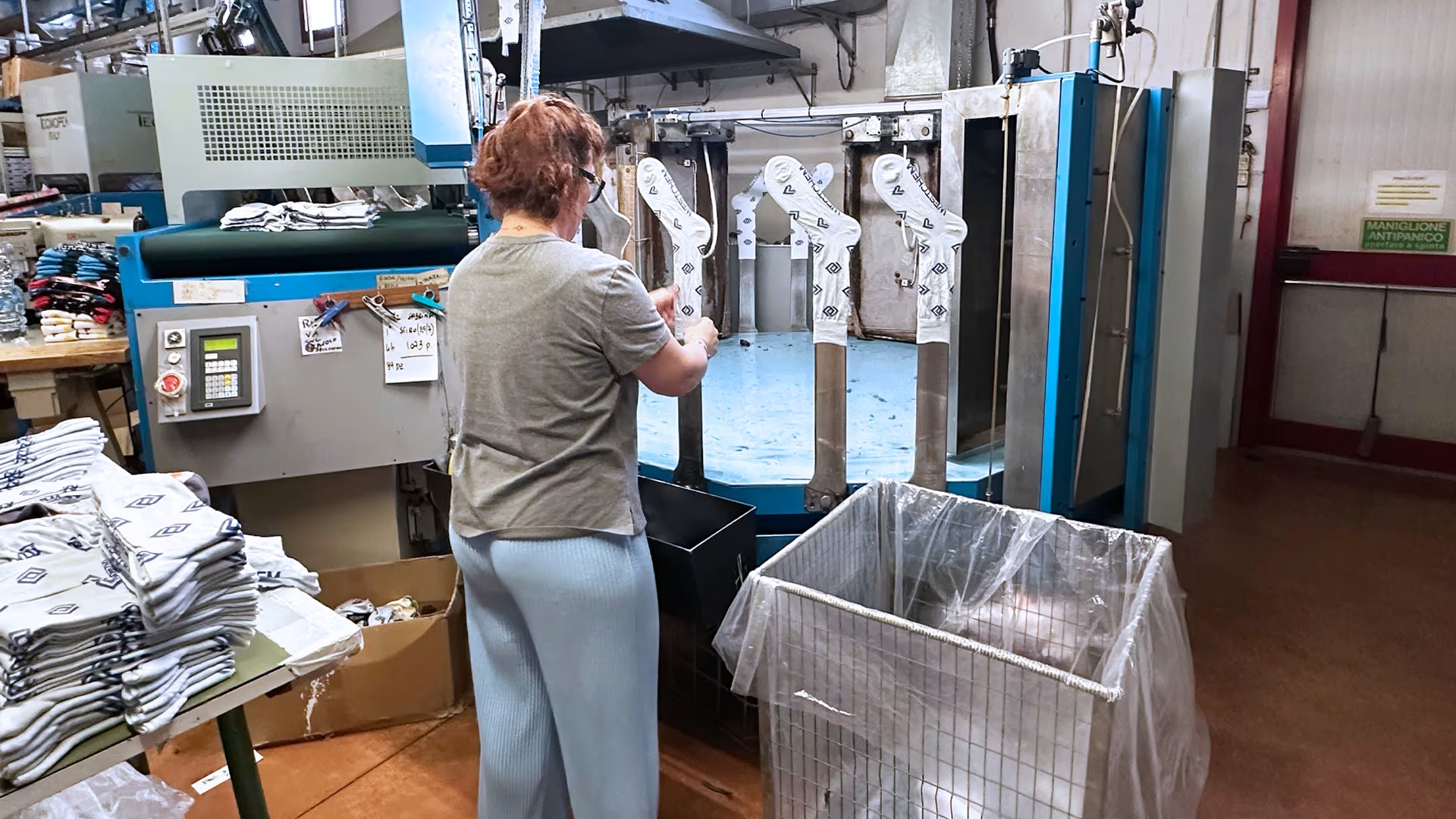Organic Cotton and Conventional Cotton: A Comprehensive Comparison

We often hear the buzzwords “organic” and “sustainable” tossed around, but have you ever stopped to think about how these terms apply to cotton?
When contrasting between organic cotton vs regular cotton, we have to consider their growth process, water consumption, and manufacturing process methods.
We'll take you from the cotton fields to the final finished fabrics, delving into the disparities between these two cotton fibers variants and their significance.
The Growing Process

The seeds of difference between organic and conventional cotton are sown during the growing process itself.
While organic cotton is nurtured from natural seeds and cultivated using sustainable methods, normal cotton relies on genetically modified seeds and an arsenal of pesticides.
In fact, a staggering 80% of regular cotton is genetically modified, making it one of the world’s largest GM crops.
But weeding out the differences doesn’t stop there! Here are some key distinctions between organic and GM cotton farming:
- Organic cotton fields are meticulously weeded by hand and other natural methods.
- Regular cotton farming employs a cocktail of toxic chemicals like herbicides, pesticides and other harmful chemicals.
- This excessive use of chemicals can lead to a vicious cycle, as bugs become more resistant, requiring even more pesticides to be sprayed.
With more than half of cotton being genetically modified, its no surprise that organic cotton is gaining popularity.
Water Usage

When it comes to quenching the thirst of cotton plants, the water usage of organic and regular cotton varies significantly.
Organic cotton certification guarantees that the cotton is made according to strict environmental and social standards.
It takes 91% less water to produce organic cotton.
The secret to this water-saving lies in organic cotton farming methods, such as crop rotation and nutrient-rich soil that retains water in the same crop, reducing the need for irrigation.
On the other hand, conventional cotton farming can have a detrimental effect on the environment, depleting soil quality and contaminating water sources with chemical pesticides and fertilizers.
When you choose to purchase organic cotton or other considered organic products like clothing, cotton sheets or textiles, you can support sustainable organic farming and practices that contribute to preserving our precious water and natural resources.
Production Techniques
Peeling back the layers of conventional cotton in production reveals further distinctions between non-organic cotton farming and the counter.
Organic cotton production adheres to strict environmental and social criteria, such as the Global Organic Textile Standard (GOTS), which ensures the absence of harmful chemicals and toxic dyes.
Moreover, organic cotton production champions ethical labor practices, providing fair wages and safe working conditions for farmers and workers.
Not to mention, production of standard cotton often involves the use of harsh chemicals, in the form of chemical dyes, fertilizers, and pesticides, which pose as many health risks to the farmers as it does to the environment.
Organic cotton bleached without the use of harsh chemicals, produces a higher-quality product but more importantly, supports a more sustainable and ethical production process.
Harmful Chemicals Used in Cotton Production
The production of conventional cotton involves the use of numerous harmful chemicals, which have detrimental effects on both the environment and human health. These toxic chemicals create the dirtiest crop and include:
- Pesticides and Insecticides: Cotton production consumes approximately 16% of the world's insecticides and 7% of pesticides (World Wildlife Fund, 2020).
- Some of the most hazardous pesticides on the market, such as aldicarb and parathion, are commonly used in regular cotton farming.
- Synthetic Fertilizers: To boost crop yields, many regular cotton farmers rely heavily on synthetic fertilizers.
- These contain high levels of nitrogen, phosphorus, and potassium, which can contaminate water supplies and cause harm to aquatic life.
- Defoliants: These are chemicals used to cause the cotton plant leaves to fall off, making the cotton easier to harvest.
- One commonly used defoliant is tribufos, which is known to be harmful to human health.
- Bleaches and Dyes: During the processing of cotton into textiles, harmful chemicals such as chlorine bleach and azo dyes, which can release carcinogenic substances, are often used.
By choosing to buy organic cotton only, you can help reduce the demand for these harmful substances, contributing to a healthier environment and safer working conditions for the world's cotton farmers and workers.
Benefits of Choosing Organic Cotton

Having contrasted between regular and organic cotton, let's deep dive into the advantages of buying organic products:
Hypoallergenic Properties
One of the standout benefits of organic cotton is its hypoallergenic properties, making it a safe haven for sensitive skin and allergy sufferers.
Since organic cotton is free from synthetic pesticides and toxic dyes, it’s less likely to cause skin irritations or trigger allergies compared to conventional cotton.
Furthermore, organic cotton is renowned for its softness, breathability, and durability, providing ultimate comfort and a healthier option for your skin compared to normal cotton.
So, whether you’re prone to skin allergies or simply prefer a gentler touch, organic cotton is a fantastic choice to keep your skin happy and healthy.
Environmental Impact

Organic cotton farming benefits our skin and our planet.
With a lower carbon footprint and fewer resources used than normal cotton, organic cotton farming is a more environmentally friendly alternative.
By reducing greenhouse gas emissions, using fewer chemical fertilizers, herbicides, and pesticides, and less carbon emissions by increasing organic carbon sequestration, organic cotton farming contributes to a greener, cleaner world.
Choosing organic cotton has several benefits:
- It helps to conserve water resources, as it relies on natural rainfall and groundwater instead of irrigation, reducing excessive water usage.
- It reduces the use of harmful chemicals.
- It promotes soil health and biodiversity, as organic farming practices focus on maintaining a balanced ecosystem.
- By opting for organic cotton, you’re playing an active role in protecting our environment and promoting a more sustainable future.
Ethical Practices

The journey of certified organic cotton from seed to finished product is one that supports ethical practices at every step of the way.
Fair labor practices are a cornerstone of certified organic cotton production, ensuring fair wages for workers, preventing child or forced labor, and guaranteeing ethical working conditions.
Lastly, an important difference between organic cotton vs conventional cotton is that organic farming creates a healthier work environment for farmers and workers, reducing exposure to hazardous substances and pesticides, and promoting a more sustainable work atmosphere.
By choosing organic cotton growers, you’re not only investing in a high-quality product but also supporting a more ethical and responsible production process.
Challenges and Drawbacks of Organic Cotton
Although organic cotton boasts countless benefits, it also comes with its share of challenges and drawbacks. Some of these challenges include:
- Higher costs compared to conventional cotton products
- Limited availability
- Difficulty in finding a wide range of styles and designs
However, understanding the reasons behind these challenges can help us appreciate the true value of organic products.
Let's break it down:
Higher Costs
Organic cotton products often come with a higher price tag, but it’s essential to consider the factors that contribute to these costs.
Sustainable production methods, lower crop yields, and the labor-intensive nature of organic cotton farming all play a role in driving up the price.
In fact, organic cotton products certified by the Global Organic Textile Standard (GOTS)
usually cost 20-30% more than regular cotton.
However, by investing in organic cotton, you’re supporting:
- eco-friendly practices
- ethical practices
- a healthier environment
- a more sustainable future.
Availability and Accessibility
Finding and purchasing organic cotton products can be a challenge in some markets.
The limited availability of organic cotton is attributed to factors such as:
- the scarcity of non-GM seeds
- market fluctuations
- climate change
- higher production costs
However, organic cotton is gaining popularity in countries like India, Turkey, China, and Kyrgyzstan, among others, and can be found in high-end fashion streets, top retail spots, and online stores specializing in both organic products and sustainable goods.
By seeking out and supporting organic cotton products, you’re helping to create a demand for more sustainable and eco-friendly options in the global consumption market.
Organic Cotton Custom Socks from Sockrates

At Sockrates, we offer GOTS certified organic cotton socks that steal the limelight!
Manufactured with love in Italy, our personalized socks are designed with a reinforced toe and heel to ensure they last.
We've got you covered with a variety of sizes and lengths, from no-show and ankle to crew and knee-high, so you'll always find your perfect fit.
And guess what? We promise a swift 25-day turnaround for standard orders, and for those in a hurry, we've got a 7-day turnaround for premium orders.
At Sockrates, we're all about making your custom sock dreams come true, offering free design services with unlimited revisions, custom labels, and full unlimited Pantone color matching.
And to top it all off, each pair comes with a free high-quality label and we'll ship your order anywhere in the world, absolutely free.
Organic Custom Grip Socks

Looking for an organic custom sock that offers excellent traction and support?
Sockrates’ custom grip socks are a fantastic enhancer for your custom organic cotton socks.
Whether you're looking for enhanced comfort for your own daily activities, or a thoughtful gift for employees, business partners, or general staff, Sockrates' custom grip socks can provide exceptional support and traction, proving beneficial for a wide array of people and pursuits.
Caring for Your Organic Cotton Products

In order to maximize the benefits of your organic cotton products, proper care is mandatory.
Washing, drying, storing, and folding techniques can all help maintain the quality and longevity of your organic cotton items, ensuring that they remain a staple in your wardrobe for years to come.
Washing and Drying
When it comes to washing your organic cotton products, cold water is key.
Not only does it help prevent fabric shrinkage and color fading, but it’s also more energy-efficient and eco-friendly.
Additionally, skip the bleach and opt for gentle, natural detergents to keep your organic cotton items looking their best.
Once washed, either air-dry or tumble dry on low heat to maintain the quality and shape of your organic cotton products.
Storing and Folding
Proper storage and folding techniques can make all the difference in extending the life of your organic cotton items.
The file folding technique, also known as the KonMari method, is a popular way to keep your clothes organized and tidy.
For heavier items like sweaters, use quality hangers and dust bags to maintain their shape and prevent wrinkles or stretching.
By taking the time to care for your organic cotton products, you’ll be rewarded with long-lasting, sustainable wardrobe staples.
Read our blog on How to Care for Your Cotton Socks to learn more.
Alternatives to Organic Cotton
Though organic cotton is beneficial in a sustainable environment in many ways, it’s worthwhile to consider alternative fabrics.
One such option is Tencel, a fabric made from sustainably sourced wood pulp, often derived from eucalyptus or beech trees.
Tencel is known for its softness, breathability, and eco-friendly production processes.
Recycled cotton, created by repurposing post-consumer or post-industrial cotton waste, is another commendable choice, reducing the demand for new cotton cultivation and minimizing environmental impact.
Additionally, hemp fabric offers an eco-conscious alternative due to its low water and pesticide requirements, making it an attractive option for those seeking sustainable alternatives to traditional cotton.
These alternatives open up exciting possibilities for environmentally conscious consumers and businesses seeking greener textile options.
Summary
In conclusion, the choice between growing organic cotton and regular cotton involves considering factors such as growing processes, water usage, production techniques, and ethical practices.
Organic cotton offers numerous benefits, such as hypoallergenic properties, reduced environmental impact, and support for fair labor practices.
While challenges like higher costs and limited availability may arise, understanding the reasons behind these drawbacks can help us appreciate the true value of organic cotton.
By choosing organic cotton products and caring for them properly, you can participate in creating a more sustainable and eco-friendly future.
If you are interested in starting your own organic custom sock project, get in touch with us!
Frequently Asked Questions
Does Organic Cotton Shrink?
Yes, organic cotton fibers can shrink when washed and dried at high temperatures.
To prevent this, it's recommended to wash organic cotton in cold water and air dry or tumble dry on low heat.
Pre-washed organic cotton products are less likely to shrink significantly, but taking these steps will help maintain the size and shape of your organic cotton items over time.
Is organic cotton better than regular cotton clothing?
Organic cotton is of higher quality and softer than regular cotton, as it uses no chemical pesticides or fertilizers, limits soil erosion, and produces less CO2 emissions.
It also results in a better life for the people who grow it and those who use it.
Does organic cotton feel the same as regular cotton?
Organic cotton is known to be thicker, softer and last longer than regular cotton, making it a more comfortable and sustainable choice for clothing.
What are the main differences between organic and regular cotton?
Organic cotton is grown using natural seeds and eco-friendly production techniques, while normal cotton uses GMO seeds and requires more water and pesticides.
What are the benefits of organic cotton for sensitive skin?
Organic cotton is better for sensitive skin than regular cotton because it's hypoallergenic and less likely to cause skin irritation.
How can I properly care for my organic cotton products?
To properly care for your organic cotton products, wash in cold water, avoid using bleach and air or tumble dry on low heat. Additionally, store and fold them carefully to keep their quality intact.
You can learn more about taking care of your cotton socks in more details by reading our recent blog "How to Care for Cotton Socks".
To stay updated on all the latest sock styles and to learn more about organic cotton vs regular cotton, be sure to follow us on LinkedIn.














